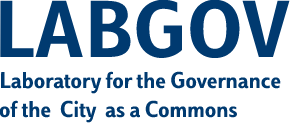About LabGov

The first LabGov was founded in 2011 at LUISS Guido Carli University in Rome by Professor Christian Iaione as an applied research laboratory that sought to bring together international scholars from various disciplines, along with practitioners and other experts from around the globe, to explore innovative forms of stewardship and governance of shared urban resources.
The History of LabGov Georgetown

The first LabGov was founded in 2011 at LUISS Guido Carli University in Rome by Professor Christian Iaione as an applied research laboratory that sought to bring together international scholars from various disciplines, along with practitioners and other experts from around the globe, to explore innovative forms of stewardship and governance of shared urban resources. LabGov soon became internationally renown for its role in helping to draft and implement the Bologna Regulation on the Urban Commons, which became a celebrated international example of innovation in this area.

The Bologna Regulation was drafted after two years of immersive field work and three “urban commons governance labs” run by Professor Christian Iaione. The Bologna Regulation is a 30-page regulatory framework outlining how local authorities, citizens, and the community at large can manage public and private spaces and assets together. It is a sort of handbook for civic and public collaboration, and also a new vision for government. It reflects the strong belief that we need a cultural shift in terms of how we think about urban governance, moving away from the Leviathan or Welfare State toward more collaborative or polycentric forms of governance.

Bologna became the site of the first ever international conference on the urban commons, sponsored by IASC, which was held in November 2015 and drew over 200 researchers and practitioners from around the world. For an overview of this conference, its many successes, and its “creative energy,” read one participant’s reflections of the conference here.
Due in part to the success and acclaim of the Bologna Regulation, other LabGov’s began to emerge around the globe, from Costa Rica, to Saõ Paolo, to New York and beyond. LabGov Georgetown is one of the newest LabGov’s to emerge and remains in close partnership with the founding and original LabGov in Italy.
LabGov Georgetown, like the other LabGovs, is primarily focused on exploring and further developing what is referred to as “commons” research, which focuses on access to, and the governance of, shared resources, both tangible and intangible, and open access spaces. This body of research was first inspired by the ground-breaking work of American political economist Elinor Ostrom, whose research on the commons won her the Nobel Peace Prize in 2009. Ostrom, who remains the only woman to ever receive a Nobel Peace Prize in Economics, shattered conventional wisdom regarding shared, open-access resources, which was then based on Garrett Hardin’s famous Tragedy of the Commons thesis. This thesis held that unowned spaces or resources, in the absence of government regulation or private ownership, will ultimately fall victim to human greediness, and therefore, over-exploitation and ultimate depletion. Through a series of powerful empirical case studies, Ostrom proved that Hardin’s pessimistic conclusion was not inevitable, and that instead, in certain contexts, communities and collections of individuals can successfully collaborate, even in the absence of governmental regulation or privatization, to sustainably manage open access resources.

Ostrom’s work primarily focused on natural resources, such as rivers, lakes, fisheries, and forests. The LabGov project expands on, and extends, Ostrom’s line of inquiry to a new field entirely: the city. Using Ostrom’s many insights and design principles as guidance, the LabGov attempts to understand and explicate how, under what circumstances, using which tools, and according to which principles, coalitions of individuals come together in urban contexts to share, enjoy and utilize their shared living spaces and resources.
LabGov treats the city as a “commons,” or a shared, open access resource to which its residents are entitled to utilize and enjoy for their mutual advantage and benefit. It explores the creative, nuanced, and multi-faceted ways that communities, local governments, civil society organizations, and certain private actors collaborate together to enjoy, govern and use their city in this way. Finally, it attempts to identify the patterns, themes, and commonalities, what we refer to as the “design principles,” that make certain initiatives successful, sustainable and accessible to all members of the community in ways that advance principles of distributive justice.

